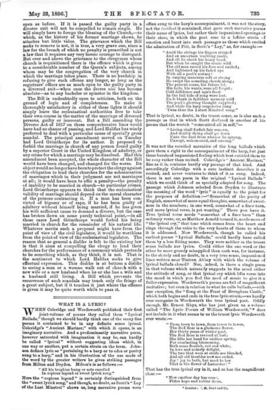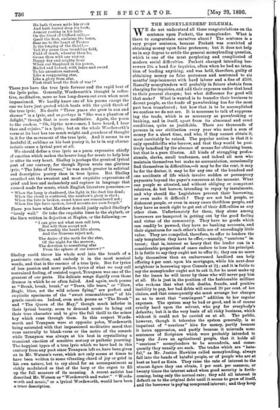WHAT IS A LYRIC Av - HEN Coleridge and Wordsworth published their
first joint-volume of poems they called them "Lyrical Ballads," though we should hardly think one of the many fine poems it contained to be in any definite sense lyrical. Coleridge's "Ancient Mariner," with which it opens, is an imaginary narrative. And a predominantly narrative poem, however saturated with imagination it may be, can hardly be called "lyrical" without suggesting ideas which, in one way or another, put a certain strain on the term. John- ton defines lyric as "pertaining to a harp or to odes or poetry sung to a harp," and in his illustration of the use made of the word by the greater writers he gives striking passages &yin Milton and Dryden. Milton's is as follows :—
" All his trophies hang or acts enrolled
In copious legend or sweet lyrick song."
Here the "copious legend" is certainly distinguished from the "sweet lyrick song," and though, no doubt, as Scott's "Lay of the Last Minstrel" shows no, long narrative poems were
often sung to the harp's accompaniment, it was not the story, not the incident it contained, that gave such narrative poems
their name of lyrics, but rather their impassioned openings or their close, in which the poet rose to a loftier strain ( f emotion and burst into such passages as those which excited the admiration of Pitt, in Scott's "Lay," as, for example ;— " Amid the strings his fingers strayed And an uncertain warbling made, And oft he shook his hoary head. But when he caught the music wild The old man raised his face and smiled; And lightened up his faded eye With all a poet's ecstasy !
In varying measures soft or strong He swept the sounding chords along The present scene, his future lot, His toils, his wants, were all forgot : Cold diffidence and age's frost In the full tide of song were lost. Each blank in faithless memory void The poet's glowing thought supplied ; And while his harp responsive rung 'Twas thus the Latest Minstrel sung."
That is lyrical, no doubt, in the truest sense, as is also such a passage as that in which Scott declared in another of his poems that the wretch "concentred all in Belt"—
" Living shall forfeit fair renown, And doubly dying shall go down Unto the dust from whence lie sprung, Unwept, unhonoured, and unsung."
It was not the versified narrative of the long ballads which gave them a right to the accompaniment of the harp, but just those bursts of impassioned feeling which best entitled them to be sung rather than recited. Coleridge's "Ancient Mariner," fine as it is, contains hardly any passage of that kind. And
accordingly Coleridge with a sure instinct describes it as recited, and never ventures to think of it as sung. Indeed, there is not one poem in the original "Lyrical Ballads" which we could think of as specially adapted for song. The passage which Johnson selected from Dryden to illustrate the meaning of the word " lyric " is equally to the point for the purposes of definition :—" Somewhat of the purity of English, somewhat of more equal thoughts, somewhat of sweet- ness in the numbers ; in one word, somewhat of a finer turn, and more lyrical verse, is yet wanting." There you have it. True lyrical verse needs "somewhat of a finer turn" than ordinary verse, or, as Matthew Arnold termed it, needs more of " the lyrical cry," that tone which comes from the heart and rings through the voice to the very hearts of those to whom it is addressed. Now Wordsworth, though he called his earliest poems "Lyrical Ballads," could hardly have called them by a less fitting name. They were neither in the truest sense ballads nor lyrics. Could either the one word or the other be more grossly misapplied than each was, for instance, to the stately and no doubt, in a very true sense, impassioned lines written near Tintern Abbey with which the volume of
lyrical ballads closed? Nor, indeed, is there a single poem in that volume which naturally suggests to the mind either the attitude of song, or that lyrical cry which lifts verse into the mood in which you feel the need of music to give it a fuller expression. Wordsworth's poems are full of magnificent recitative; but even in relation to what he calls ballads,—with
one exception, the "Song at the Feast of Brougham Castle," which both begins and ends in the true lyric strain,—we hardly ever recognise in Wordsworth the true lyrical poet. Oddly enough, Mr. Ernest Bhp!, who has just given us a volume called "The Lyric Poems of William Wordsworth,"* does not include in it what seems to us the truest lyric Wordsworth ever wrote:—
" From town to town, from tower to tower, The Red Rose is a gladsome flower. Her thirty years of winter past,
The Red Rose is revived at last; She lifts her head for endless spring, For everlasting blossoming.
Both roses flourish, red and white, In love and sisterly delight, The two that were at strife arc blended,
And all old troubles now are ended.
Joy ! joy to both, but most to her That is the flower of Lancaster !"
That has the true lyrical cry in it, and so has the magnificent close :---
"Now another day has corn-, Fitter hope and nobler doom,
•
London; 7. K. Dent and Co. He bath thrown aside his cr Jok
And bath buried deep his book, Armour rusting in his hall3 On the blood of Clifford calls — Quell the Scot, exclaims the lance, Bear me to the heart of France Is the longing of the Shie]l,— Tell thy name thou trembling field, Field of death, where'er thou be, Groan thou with our victory.
Happy day and mighty hour When our Shepherd in his power.
Mailed and horsed, with lance and sword To his ancestors restored, Like a reappearing star, Like a glory from afar.
First shall head the flock of war !"
There you have the true lyric fervour and the rapid beat of the lyric pulse. Generally, Wordsworth's thought is reflec- tive, meditative, more or less long-drawn out even when most impassioned. We hardly know one of his poems except the one we have just quoted which beats with the quick throb of
the true lyric. No doubt "Three years she grew in sun and shower" is a lyric, and so perhaps is "She was a phantom of delight," though that is more meditative. Again, the poem to the cuckoo, "Oh, blythe new-comer, I have heard, I hear thee and rejoice," is a lyric; but on the whole Wordsworth's verse at its best has too much weight and grandeur of thought in it for the movement of the true lyric. And it seems to us
doubtful if, sublime as his best poetry is, he is in any charac- teristic sense a lyrical poet at all.
We should define a true lyric as a poem expressive chiefly of emotion which makes the hearer long for music to help him to utter its very heart. Shelley is perhaps the greatest lyrical poet of our century, for though Byron wrote one glorious lyric, "The Isles of Greece," he was much greater in satirical and descriptive poetry than in true lyrics. But Shelley ,oreathed out the sweetest and most exquisite expressions of grief and love and melancholy and rapture in language that seemed made for music, which English literature possesses :—
" When the lamp is shattered, the light in the dust lies dead; When the cloud is scattered, the rainbow's glory is shed ; When the lute is broken, sweet tones are remembered not ; When the lips have spoken, loved accents are soon forgot."
There you have what Matthew Arnold justly called Shelley's "lovely wail." Or take the exquisite lines to the skylark, or the lines written in dejection at Naples, or the following
I can give not what men call love, But wilt thou accept not
The worship the heart lifts above, And the Heavens reject not, The desire of the moth for the star, Of the night for the morrow, The devotion to something afar From the sphere of our sorrow ?"
Shelley could throw his whole soul into the breath of a passionate emotion, and embody it in the most musical words, and that is the essence of a true lyric. But for lyrics of less passion and more pathos, lyrics of what we may call restrained feeling, of resisted regret, Tennyson was one of the greatest of our poets. His delicate songs dignify even those
-dramas in which he so often failed. And again, such poems as "Break, break, break," or "Tears, idle tears," or "Blow, Bugle, blow, set the wild echoes flying," are perfect and exquisite specimens of the "sweet reasonableness" of his
gentle emotions. Indeed, even such poems as "The Brook" and "The Queen of the May," though much inferior in their lyrical beauty, seem to demand music to bring out their true character and to give the full thrill to the minor key which runs through them. In this respect Words- worth and Tennyson were at opposite poles, Wordsworth being saturated with that impassioned meditative mood that runs naturally to blank-verse or the metre of the sonnet,
while Tennyson was always at his best in crystallising a transient emotion of sensitive ecstasy or pathetic yearning. The happiest types of a true lyric which we have had in this century from any poet since Tennyson left us, have been given
us in Mr. Watson's verse, which not only seems at times to have been written to some vibrating chord of joy or grief in his own nature, but to cry aloud for an accompaniment as richly modulated as that of the harp or the organ to fill up the full measure of its meaning. A recent satirist has described Mr. Watson as "Wordsworth and water." "Words- worth and music," or a lyrical Wordsworth, would have been a truer description.



































 Previous page
Previous page